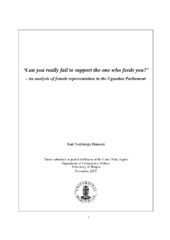| dc.description.abstract | The Ugandan Parliament has seats reserved for women. According to the 1995 Constitutionone woman shall be elected from each district. Hence, the 56 District WomenRepresentatives are elected in addition to the 214 regular MPs creating a ‘double’representation in Parliament. Given the ‘double’ representation, the District WomenRepresentatives have often by the voters been regarded as representatives of women inparticular. This thesis takes advantage of Hanna Pitkin’s work on the concept ofrepresentation, and her dichotomy between “Standing For” representatives and “ActingFor” representatives. If women in Uganda represent the district they would be “StandingFor” descriptive representatives; they are elected to Parliament based of their characteristicsas women. If the affirmative action women feel an obligation to represent women inparticular, they would be “Acting For” representatives.Furthermore, for two reasons the District Women Representatives have particularly closeties to the Government: First, the affirmative action seats in Uganda are interpreted as a‘gift’ given to Ugandan women from the NRM regime. Second, the District WomenRepresentatives are elected to Parliament through Electoral Colleges consisting of officialswith close ties to the Government. It can be argued that because of these close ties theDistrict Women Representatives are expected to “Act As” Movementist in Parliament,hence increasing governmental support. In this they come close to what Pitkin refers to as“Standing For” symbolic representatives.The findings of this thesis indicate that some of the District Women Representatives “ActFor” women, while there are some women who merely “Stand For” them. Generally, mostof the affirmative action women support the NRM. This has made it hard for them tochallenge the Government is issues they find important. Moreover, this thesis also showsthat although the female representation in Parliament is quite high, this does not necessarilystrengthen the idea that women can be as capable politicians as men – as the affirmativeaction measures are intended to do. | en_US |
